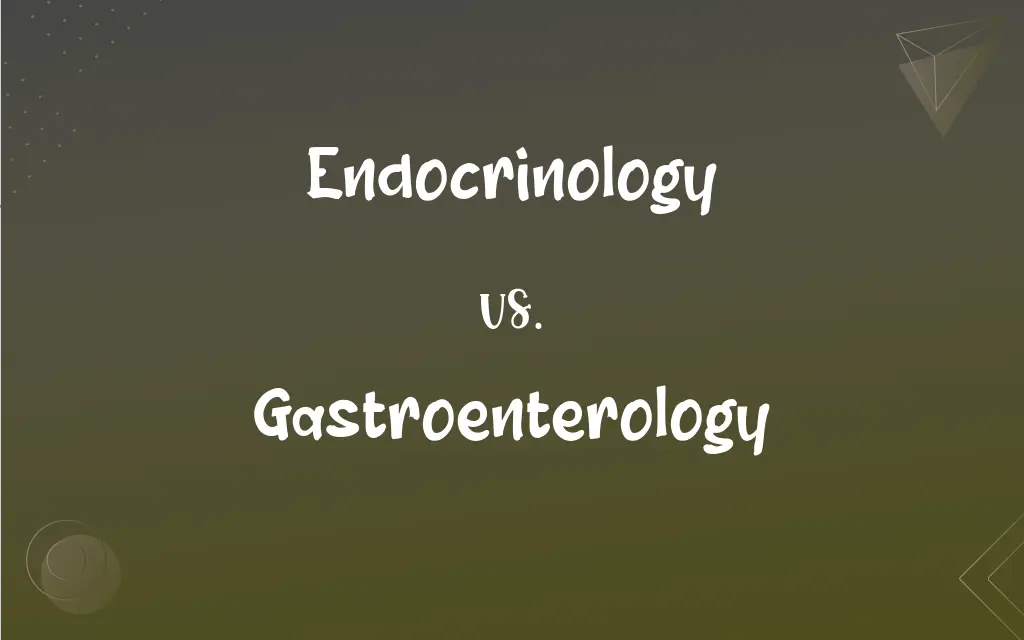Endocrinology vs. Gastroenterology: What's the Difference?
Edited by Harlon Moss || By Janet White || Published on February 1, 2024
Endocrinology studies hormone-related diseases; gastroenterology focuses on digestive system disorders.

Key Differences
Endocrinology is the medical science focusing on the endocrine system, including glands and hormones. Gastroenterology, in contrast, deals with the digestive system, encompassing the stomach, intestines, and related organs.
Endocrinologists specialize in disorders like diabetes and thyroid issues, which involve hormonal imbalances. Gastroenterologists, however, are experts in conditions like IBS and acid reflux, affecting the gastrointestinal tract.
Treatment in endocrinology often involves hormone therapy and managing metabolic dysfunction. Gastroenterology's approach is more varied, including dietary management, medication, and sometimes surgical interventions for digestive issues.
Endocrinology includes studying how hormones influence metabolism, reproduction, and growth. Gastroenterology focuses on understanding how food is digested and nutrients are absorbed, along with managing digestive diseases.
Endocrine disorders can affect the entire body, highlighting endocrinology's systemic approach. Gastroenterology, while also impactful, primarily addresses localized issues within the gastrointestinal system.
ADVERTISEMENT
Comparison Chart
System Focus
Endocrine system (hormones, glands)
Digestive system (stomach, intestines)
Common Conditions
Diabetes, thyroid disorders
IBS, acid reflux
Treatment Approaches
Hormone therapy, metabolic management
Dietary management, medication, surgery
Study Focus
Hormonal influence on body functions
Digestion and nutrient absorption
Impact on the Body
System-wide (e.g., growth, metabolism)
Localized to the gastrointestinal tract
ADVERTISEMENT
Endocrinology and Gastroenterology Definitions
Endocrinology
Study of hormones and their disorders.
Her interest in diabetes led her to specialize in endocrinology.
Gastroenterology
Science of treating esophageal, stomach, and bowel ailments.
Advances in gastroenterology have improved ulcer treatments.
Endocrinology
Medical field dealing with the endocrine system.
Endocrinology often involves treating thyroid problems.
Gastroenterology
Branch of medicine dealing with stomach and liver health.
Liver cirrhosis is a key concern in gastroenterology.
Endocrinology
Science of glandular activities and hormonal secretions.
He researched adrenal gland dysfunction in endocrinology.
Gastroenterology
Study of the digestive system and its disorders.
She consulted a gastroenterology expert for her stomach issues.
Endocrinology
Discipline focused on hormonal imbalance and its effects.
Endocrinology is crucial in understanding puberty and growth.
Gastroenterology
Examination of digestive tract function and pathology.
Gastroenterology plays a role in diagnosing food intolerances.
Endocrinology
Examination of how hormones affect metabolism.
Studying obesity requires knowledge of endocrinology.
Gastroenterology
Medical practice focused on intestinal diseases.
Gastroenterology covers conditions like Crohn's disease.
Endocrinology
The branch of medicine that deals with the diagnosis and treatment of diseases and disorders of the endocrine glands.
Gastroenterology
The branch of medicine that deals with the diagnosis and treatment of diseases and disorders of the digestive system.
Endocrinology
(physiology) The study of the endocrine glands of the human body, the hormones produced by them, and their related disorders.
Gastroenterology
(medicine) The study of the digestive system, from the mouth to the anus; may also include the study of accessory organs: pancreas, liver, gallbladder and bile ducts.
Endocrinology
The branch of medicine dealing with the endocrine glands and their secretions
Gastroenterology
The branch of medicine that studies the gastrointestinal tract and its diseases
FAQs
Can gastroenterology involve surgical treatments?
Yes, some digestive disorders may require surgical intervention.
Are diabetes and thyroid issues related to endocrinology?
Yes, they are key areas of focus in endocrinology.
What does a gastroenterologist do?
They diagnose and treat disorders of the digestive system.
How do hormones affect metabolism in endocrinology?
Hormones regulate metabolic processes, impacting energy and growth.
What is endocrinology?
It's the study of the endocrine system and hormonal disorders.
How do endocrinologists treat hormonal imbalances?
Often through hormone replacement or regulation therapies.
Can endocrinology help with weight management?
Yes, as it deals with metabolic disorders affecting weight.
Is gastroenterology related to liver health?
Yes, it includes the study and treatment of liver diseases.
How does gastroenterology address digestive infections?
Through medication and, in some cases, dietary changes.
Does endocrinology cover reproductive health?
Yes, as it involves hormones, which are key in reproduction.
What role does diet play in gastroenterology?
Diet is crucial in managing many digestive disorders.
Are IBS and acid reflux part of gastroenterology?
Yes, they are common conditions treated in this field.
Are endocrine disorders hereditary?
Some, like certain thyroid conditions, can have genetic links.
What diagnostic tools are used in gastroenterology?
Endoscopy, colonoscopy, and imaging tests like CT scans are common.
Can hormonal issues affect growth and development?
Yes, which is why endocrinology is key in pediatric care.
Do gastroenterologists perform surgery?
While they primarily diagnose and manage treatment, some also perform procedures like endoscopic surgeries.
What is the role of insulin in endocrinology?
Insulin is a crucial hormone studied in endocrinology, especially regarding diabetes.
Can gastroenterology treatments include lifestyle changes?
Yes, lifestyle and dietary changes are often part of treatment plans.
What are common diseases treated in endocrinology?
Diabetes, thyroid disorders, and adrenal issues are common.
What’s the difference between a gastroenterologist and a dietician?
A gastroenterologist is a medical doctor specializing in digestive diseases, while a dietician focuses on nutrition and diet planning.
About Author
Written by
Janet WhiteJanet White has been an esteemed writer and blogger for Difference Wiki. Holding a Master's degree in Science and Medical Journalism from the prestigious Boston University, she has consistently demonstrated her expertise and passion for her field. When she's not immersed in her work, Janet relishes her time exercising, delving into a good book, and cherishing moments with friends and family.
Edited by
Harlon MossHarlon is a seasoned quality moderator and accomplished content writer for Difference Wiki. An alumnus of the prestigious University of California, he earned his degree in Computer Science. Leveraging his academic background, Harlon brings a meticulous and informed perspective to his work, ensuring content accuracy and excellence.































































